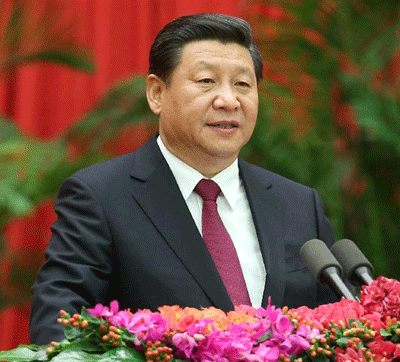|
 Chinese President Xi Jinping delivers a speech on behalf of the Communist Party of China Central Committee and the State Council at the reception celebrating the 65th anniversary of the founding of the People's Republic of China, in Beijing, China, Sept. 30, 2014.?[Photo/Xinhua] |
A number of overseas experts have highly commented on Chinese President Xi Jinping's remarks marking China's National Day on Oct. 1, saying that the remarks are not only a review of China's development over the past 65 years, but also a future outlook.
Xi made the remarks when addressing a reception in Beijing marking the 65th anniversary of the founding of the People's Republic of China (PRC).
Zheng Jiabin, deputy director of India Institute of Chinese Studies, said the whole world has witnessed China's achievements and China is not only an engine for world's economic growth, but also a role model for other developing countries.
Zheng said the "Eight Adherences" initiative Xi mentioned in his remarks is a fresh new climate in China's politics. In particular, adherence to managing the Communist Party of China (CPC) on a strict scale will inject a new impetus into the party's development and will win greater support from Chinese people.
The ongoing unprecedented anti-corruption campaign has not only got the Chinese people to see a firm determination, but has also led to the world's greater expectation on the CPC, Zheng said.
Zheng particularly expressed appreciation over Xi's remarks that "We must adhere to the path of peaceful development in face of the future," saying that adherence to the path of peaceful development is not only in the interest of China, but is also in line with the world's megatrend of development.
Both China and India are active champions and long-time practitioners of the Five Principles of Peaceful Coexistence, and both have adequately implemented their strategies for "peaceful development," which can not only strengthen exchanges and ties among nations, but will also, more significantly, be in the interest of maintaining the world's stability, especially stability of the Asia-Pacific region.
Therefore, Xi's remarks thereon well deserve appreciation and encouragement, Zheng said.
Cha Jae-bok, researcher of Northeast Asian History Foundation of South Korea, said the "Eight Adherences" initiative Xi mentioned in the remarks not only points out a clear direction for China's future development from a high perspective and in a forward-looking way, but also provides much valuable reference to and enlightment for other countries.
China's adherence to the path of peaceful development, in particular, indicates China's persistent adherence to pursuing development and prosperity on the basis of peace, and refusal to seek hegemonism and refusal to bully the small and the weak.
Therefore, China's adherence to the path of peaceful development will play a significant role in building a peaceful and stable development environment for the whole world and especially for the Northeastern Asian region, Cha said.
President Xi's remarks summarize the experiences and lessons of new China's development, said Yao Bing, Vice Chairman of Overseas Chinese Administrative Committee, Vientian Laos, and Honorary Chairman of Chinese Commercial Chamber in Laos.
Yao said Xi's remarks illustrate the CPC's firm determination to stay with the Chinese people and to adhere to the path of socialism with Chinese characteristics. It also, more significantly, points out existing problems facing China and the correct attitude adopted by the Chinese people toward the problems.
The insightful and practical "Eight Adherences" initiative mentioned in Xi's remarks is of profound significance for guiding China's future development, Yao added.
Abdul Moyeen Khan, a senior Bangladesh political leader, said Xi's remarks are an eye opener not only for the people of China but for all downtrodden people of the world who must be given their basic rights to development in this modern world.
Khan mentioned that the president's comment on the CPC being the key to the success of China has been aptly demonstrated by the party's idealism and performance in the last 65 years.
Chheang Vannarith, senior researcher of the Cambodian Institute for Cooperation and Peace and Lecturer of Asia Pacific Studies at the University of Leeds in Britain, hailed Xi's remarks as "strong commitment and efforts of the Communist Party of China in building a prosperous society for the Chinese people".
"To build a people-centered socialism with Chinese characteristics is a long journey. It needs patience and participation from the people from all walks of life," Vannarith added, "Clean, effective and efficient government is key to unlock Chinese potential and realize the Chinese Dream."
Shada Islam, head of policy at Friends of Europe, a Brussels-based think tank, said Xi noted reform and innovation in his remarks, both of which are vital to maintaining China's growth and development.
China needs to continue its efforts in pushing for economic reform by expanding domestic consumption, fighting corruption, limiting the privileges of state-owned enterprise, etc., Islam said.
In addition, China needs to keep its momentum on innovation. Future belongs to those countries with creativity, innovative capability and new ideas. It is essential to increase input in areas of innovation to ensure the country's promising prospect, according to Islam.
